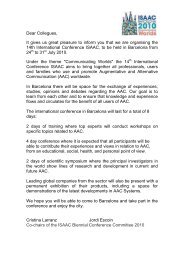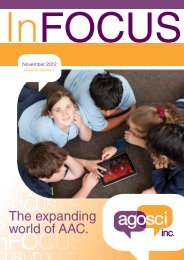eviewsThe Black Balloonby Aileen RyanAileen Ryan is well known as a major contributor to the followingMakaton Australia resources, “The Makaton Vocabulary –Australian (Auslan) <strong>Edition</strong> (2001)”, “Key Signs: a supplementto The Makaton Vocabulary Auslan <strong>Edition</strong> (2002)”, and “Let’splay with sign (2006)”.In addition to these books Aileen has published her ownresources “Sing and Sign with Me (2002)” and “Tiny Hands(2005)”. Aileen is an experienced teacher of sign. She beganto conduct sign workshops in 1996 for staff supporting herdaughter, Elysha, who has Down Syndrome and is hearingimpaired. At that time, the need for information, publicationsand education in the use of Key Word Sign was paramount,as Aileen tried to fi nd books and courses for her daughter’searly childhood staff. Aileen runs her own business “Hands CanTalk”, is a Makaton Presenter and is the Sign Liaison Officer forMakaton NSW. Her collaborative role with the stars and crewof The Black Balloon, has ensured that the fi lm’s gritty andrealistic plot has been further strengthened by the authenticapproach to the use of Key Word Sign.Simple concepts for authenticity were crucial, such as Charlie’smother (Toni Collette) was the one who signed the most fl uently,that short sentences and phrases were used when talking andsigning with Charlie, that Charlie did not use accurate signproduction and that signs used in Australia were used in thefi lm. These ideas became central to the fi lm story and arethe subtle touches that are easily recognizable for those whosupport individuals who have complex communication needsand use Key Word Sign.The following is Aileen refl ection on being involved with “TheBlack Balloon.” It has been adapted with permission fromAileen Ryan’s report on http://www.handscantalk.com.au/In January 2007, Aileen was contacted by producer TristramMiall in reference to assisting the cast with using sign languagein the movie “The Black Balloon.” At the time Aileen was onholidays and, not being truly in the mood for work, thoughtTristiam was a student producing a small movie but she saidshe was pleased to out. After getting off the phone Aileenmentioned to her family what was happening, “Tristiam hadmentioned an actress - ummm Toni ??? Yes that’s right ToniCollette.” Now everyone was getting excited. Aileen lookedup Toni Collette and talked to friends and family who, ofcourse, had seen her in quite a few movies and thought she wasfabulous. Aileen watched some of Toni’s movies and could seewhat all the hype was about -Toni was great at what she did!First MeetingAileen went to Holsworthy, the house being used for the movie,and met Tristram (Producer), Elissa (Screenwritter & Director),Toni (the mum), Erik (the dad), Rhys (the brother) and Luke(Charlie “the brother with autism”). Aileen’s comments at thetime were: “it was fun meeting everyone”, “relaxed and casualand they all picked up the sign language easily”, “we used bits ofMakaton, Auslan and Signed English” (as the books available atthe time that the movie was set in were only the Signed Englishand early Makaton book) . A few times in the movie signs wereused that were more readily available now through Auslan.Second MeetingAileen again met up on set and practiced with the cast. Havingparts of the script to work from made it easier to plan and try tokeep everything looking natural and not overdone. Aileen wasthen fi lmed doing the signs to help everyone with revision andGemma (girlfriend of Rhys’s character) was able to to do all herpractice thru the video clips.Third MeetingAileen went back and took Elysha with her to meet Rhys, orbetter known to her as Luke from “Home & Away”. Elyshawas wrapped of course and only interested in LUKE!! She hadphotos with him, saw him on set, and had lunch with LUKE.FinallyIt was hard for Aileen to not talk about the movie to all aroundher, but fi nally the movie is released and you can read reviewsfrom those who have already seen it, or look at a trailer, andread short pieces on the cast.Aileen said she did not want to be paid for her involvementin the film and fi tted in with cast and crew time-frame. Aileengot involved simply because someone asked her to and thethought of a fi lm being made and sign language being included(therefore improving and increasing people’s understandingof the use of sign language for people with speech and/ordevelopmental delay) was all the incentive Aileen needed.Go see the fi lm, it’s brilliant! Elissa (the Screenwriter andDirector) should feel fantastic. What a tribute to her lifegrowing up with two autistic brothers. Every actor in the moviegave their utmost and shone through.AAC - ISAAC’s Professional Peer Reviewed JournalAugmentative and AlternativeCommunication (AAC) is the officialjournal of the International Societyfor Augmentative and AlternativeCommunication (ISAAC), publishedquarterly. AAC publishes originalarticles with direct applicationto the communication needs ofpersons with severe speech and/orcommunication impairments for whom augmentative andalternative communication techniques and systems may beof assistance.If you are interested in subscribing to this journal, pleasesee the information in the ISAAC Membership forms,included with this edition.42
eviewsBook ReviewThe Communication Access ToolkitReveiwed by Kathryn McKinleySpeech PathologistRoyal Talbot Rehabilitation Centre, Austin Health, MelbourneKathryn.McKinley@austin.org.auParr, S., Wimborne, N., Hewitt, A. & Pound, C. (<strong>2008</strong>).The Communication Access Toolkit. London: Connect – thecommunication disability network.Price: $500, includes toolkit and two-day training courseThe Communication Access Toolkit is a new resource designedby Connect, a UK charity working to promote effective services,new opportunities and a better quality of life for people livingwith aphasia. This new toolkit was published in January <strong>2008</strong>and is the product of a three-year project undertaken byConnect. The toolkit is sold as part of a 2-day training course,run by trainers at Connect, titled “Making CommunicationAccess a reality”.The toolkit has been designed to be used as a resource tohelp clinicians raise awareness of communication access issuesin health and social care settings, as well as voluntary sectorsettings. The resource provides step-by-step guidance on howto plan, run and evaluate the training. Communication accesstraining is aimed at all service providers, from professionalsand clinicians to assistants, administrative staff and volunteers– anyone who has day-to-day contact with clients with acommunication disability.The aim of the toolkit is to equip the clinician and the serviceproviders they train, with the skills, techniques and resources tomake their service accessible to people with a communicationdisability. The toolkit provides the clinician with everything theyneed to plan, prepare, run and evaluate the “Making your serviceaccessible: communication matters” training programme. Thetoolkit includes:- the trainer’s book, for the clinician to use, which containsbackground information, the training program and extraresources (e.g. how to plan for the training, resourcesrequired)- a CD, which has all the Power Point presentations requiredto do the training, a set of tools to help with courseadministration (in PDF and Word templates e.g. a certificatefor course participants, an agenda for the training day) andpages of the trainee book so that they can be printed andgiven to the trainees- a DVD, which has video clips about communication accessto be used in the training, and- a bound copy of the trainee’s workbook.The training program works through eight modules including:- Thinking about communication access- What is a communication disability?- What is communication access?- Making interactions accessible- Making documents accessible- Making environments accessible- Communication access stories- Action planningWhilst the toolkit training program was developed by and withpeople who have aphasia, the principles of communicationaccess hold true for other groups including people withintellectual disability, developmental language delay, dyslexia,depression, anxiety, or other mental health conditions affectingcommunication, and other communication difficulties i.e. no orlimited English.The toolkit gives ideas regarding course structure, and canbe adapted to be run as a one-day session, two three-hoursessions, three two-hour sessions or six one-hour sessions,allowing for the training to be delivered fl exibly to suit trainees’work patterns and shift requirements. The toolkit also providesthe clinician with practical ideas for setting course dates,attracting potential trainees, recruiting trainers, choosing avenue, equipment and resources, and support and follow-up.The training programme uses Kagan’s (1995) “Supportedconversation for adults with aphasia” as a framework for theirtraining, particularly when discussing making interactions anddocuments accessible. However, Connect have moved awayfrom using terms such as supported conversation, read easy, oraphasia friendly, towards the term communication access whichcan be readily used for all people who have a communicationdisability. The training has the potential to be used across awide range of settings, from hospital and community health todisability and education.As the toolkit has been developed in the UK, there are someparts of the training that need adapting to be used with anAustralian population. For example, the UK’s DisabilityDiscrimination Act is discussed in one of the modules and thispart would need to be changed to discuss our local state andfederal disability acts.This is a great resource, and one that is ready for busyclinicians to start using, with all the hard work done! For moreinformation, visit Connect’s website www.ukconnect.org oremail lukechamberlain@ukconnect.org.43





